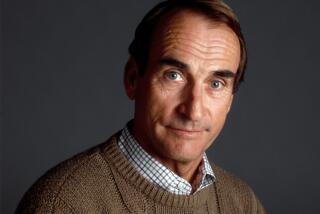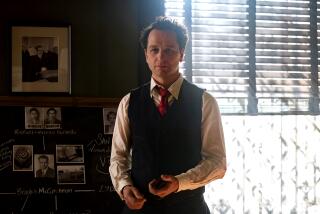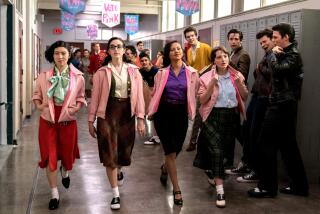‘Hill Street Blues’ paved the way for today’s golden era of TV drama
The ambitious police drama seemed doomed even before it hit the NBC airwaves on Jan. 15, 1981.
Test audiences were unimpressed by the gritty pilot that focused on the personal and professional struggles of police officers working in a crime-ridden urban precinct. In fact, many hated it — there were no recognizable stars, the camera was unsteady, the scenes were noisy and confusing, and there were too many characters.
“Hill Street Blues” got off to a shaky start, and it barely received a second season — at the time, it was among the lowest-rated shows ever renewed at the network. But audiences eventually embraced it, and, during its seven-season run, the series racked up 26 Emmys, including four consecutive awards for outstanding drama. Even today, “Hill Street Blues” is widely regarded as truly groundbreaking, and its success paved the way for the current golden era of serial TV drama where large ensembles drive complex story lines filled with heroic but flawed characters.
“There’s no question that the show was a tipping point in not only how an audience responded to TV but how those of us making TV came to see what we were doing in a very different light,” said Steven Bochco, who created “Hill Street Blues” along with partner Michael Kozoll. “It expanded the drama form and the medium. Lots of shows that came behind us might not have had the same success if we had not broken through.”
Last week, Shout! Factory released a DVD box set featuring all 144 episodes along with the original pilot, a 24-page book and new interviews with Bochco and cast members Charles Haid, James B. Sikking, Dennis Franz, Bruce Weitz and Dennis Dugan. The release marks the first time the entire series, which ended in 1987, has been released on DVD.
Before “Hill Street Blues,” police shows largely focused on crime solving and the predictable — and inevitable — triumph of good over evil. In these earlier cop shows, little attention was paid to nuance or character development.
But Bochco and Kozoll, armed with actual accounts from interviews with cops about the perils and frenzy of police work, turned the genre on its head by spotlighting the officers and detectives’ personal quandaries. The series also strove to mix high drama with dark humor and outrageous situations but all grounded in reality.
“The most important legacy, for then and afterward, was the way the show presented a realistic and not always pretty picture of what big-city police work was like,” said TV historian Tim Brooks. “Police shows prior to that were like comic books or fantasies, like ‘Starsky and Hutch.’ There were lots of nice-looking guys, and they always caught the bad guy in the end. On ‘Hill Street,’ they didn’t always get the bad guy.”
Each “Hill Street Blues” episode kicked off with the day’s roll call, for the first few seasons overseen by the formidable but fatherly Sgt. Phil Esterhaus (the late Michael Conrad). His daily rundown always ended with a phrase that soon became a cultural touchstone: “Let’s be careful out there.”
Much like a documentary, the camera work during roll call and some action sequences as well were hand-held, something that had never been done before on a network television series. The series as a whole embraced a grungy and disorderly feel unlike previous cop shows. Characters and extras crowded in front of the camera, and dialogue often overlapped, making it hard to understand everyone.
“It was messy, barely controlled chaos,” recalled Bochco, who is developing a drama, “Murder in the First,” for TNT. “We were really inventing it as we went along. There has never been anything like it before in terms of size and sloppiness. Words were tumbling out in the background, the frame was teeming with characters.”
Much of the show’s freedom — and survival — came because NBC was in dire straits when the show launched. The network needed a hit and was willing to take more chances in hopes of turning around its ratings slump.
“The unbelievably luckiest part of us doing what we were doing is that we were on a network that desperately needed credibility. They didn’t have it,” said Bochco. “If we had been on a successful network, I doubt if any of this could have happened.”
“Hill Street Blues” also had another touchstone — its melancholy, instantly hummable theme song composed by Mike Post. The theme, whose melodic tone was the opposite of the chaotic action of the show, became a Top 10 hit.
The largely unknown cast, including Daniel J. Travanti, Veronica Hamel, Betty Thomas, Michael Warren and Sikking, reached star status thanks to “Hill Street.” A couple of performers who stood out were Haid, who played the excitable and outspoken officer Andy Renko, and Weitz, who played Sgt. Mick Belker, who often exhibited animal-type behavior and was not shy about his fondness for biting people.
Weitz called “Hill Street Blues” the pinnacle of his career. “It’s the best thing that ever happened to me,” he says. “And it feels great to be part of something that set a standard and style for hour dramas that live up to this day.”
More to Read
The complete guide to home viewing
Get Screen Gab for everything about the TV shows and streaming movies everyone’s talking about.
You may occasionally receive promotional content from the Los Angeles Times.







